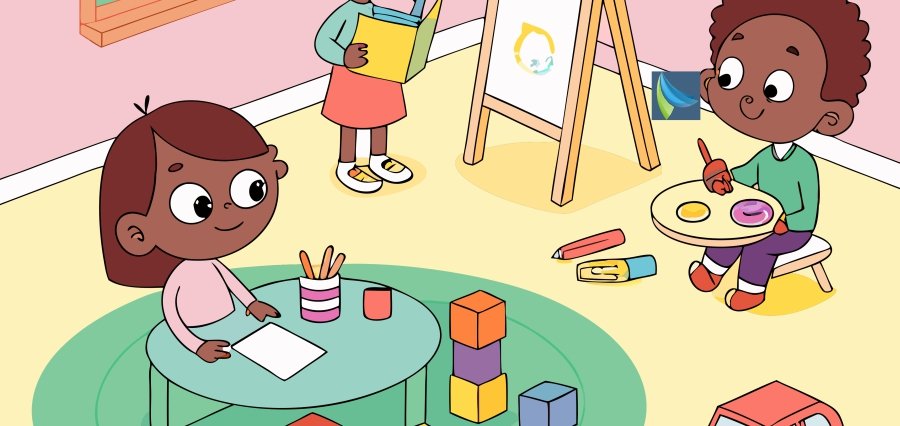child grows
Fun Learn
A summary of play-based learning benefits offers a new option for early childhood education that is the complete opposite of the traditional, formalized method. The learning process capitalizes on the inquisitiveness of young children to learn, explore, and engage with their immediate world through playing. By incorporating learning objectives in interactive learning activities, teachers create an interactive and engaging learning process that promotes overall development. This view positions play not only as a leisure activity but also as the central vehicle by which children acquire essential skills, knowledge, and disposition. These benefits are wide-ranging and have cognitive, social, emotional, and physical development impacts to a great degree.
Cognitively, play learning encourages critical thinking, problem-solving, and creativity. Children who play make-believe, such as block building or role-playing scenarios, are actively constructing knowledge and building world knowledge. They are able to test hypotheses, anticipate outcomes, and react to emergent situations as they develop through experimentation and discovery. Not only does this hone their intellectual curiosity, but it also lays a solid groundwork for future academic success. Play enables children to learn in their own way, and this provides them with a sense of ownership of the learning process. The autonomy fosters internal motivation, and children become active learners rather than passive recipients of information.
Socially, play learning encourages cooperation, communication, and empathy. Children learn to share, negotiate, and cooperate with other children and gain essential social skills in establishing healthy relationships. Group play or cooperative play offers an opportunity in which children are taught to collaborate, solve problems, and take turns. By playing, their social skills are enhanced as well as a sense of belonging and community. Play also offers children an opportunity to try out different social roles and perspectives, thereby understanding and tolerance of differences. The social-emotional intelligence that is acquired through these interactions is utilized by the children to handle complex social scenarios and form authentic relationships with other people.
Play-based learning emotionally provides a safe and supportive space where children can communicate their emotions, develop self-regulation, and be resilient.
Fantasy play enables the child to cope with emotions, acquire coping abilities, and build self-esteem. Autonomy during play enables the child to be independent and possess a solid identity. This kind of emotional development plays a crucial role in the formation of a healthy positive self-concept as well as emotional well-being. Emotional intelligence and resilience capability are key competencies to enable individuals to cope with issues of life and form efficient relationships.
Physical development through play enables gross motor skill and fine motor skill acquisition. Running, jumping, climbing, and manipulations also enhance coordination, balance, and dexterity in children. All these exercises enhance their overall state of health and physical status and prepare them for future physical and sport performance. Incorporation of movement into learning activities also enables cognitive development because exercise enhances better attention, memory, and problem-solving capacity. Active involvement brought about by play results in the development of good habits and a good attitude towards exercising.
Play learning also brings about attachment to learning. As a result of developing an atmosphere of learning which is enjoyment and pleasure through learning, children are favorably inclined towards learning which can be long-term. The self-motivation created during play is intrinsic in nature and enables children to develop a habit of learning that may last a lifetime and seek new experience and learning. The use of play in learning also removes tension and stress associated with learning in the conventional way, and learning becomes less stressful and more relaxing so that the child can develop a lifelong passion for learning.
The integration of various fields of learning into play-based learning offers an holistic mode of learning. The children are not confined within subject boundaries but can learn complementary fields freely. As an illustration, building activity can be integrated with mathematical concepts, problem-solving, and socialization. This multi-faceted learning helps children understand the broad picture of the world and fosters the skill of acquiring transferable skills. This is the strategy that assists in nurturing balanced individuals capable of withstanding the challenges and possibilities of the 21st century.
Play-based learning teachers are educators who plan rich, challenging learning spaces and facilitate children’s inquiry. They observe children playing, observe learning possibility, and provide appropriate support and scaffolding. Teachers must be responsive, adaptable, and attuned to children’s unique needs and interests. The ability to plan a rich and dynamic learning environment contributes significantly to maximizing the potential of play-based learning.
The long-term consequences of learning through play also extend far into the future of a child, influencing a child’s school performance, social skills, and emotional intelligence throughout their whole life. Children who have learned through play will be more innovative, creative, and resilient with the capabilities and competencies to thrive in an ever-changing world. Through developing a passion for learning and a template for life-long development, play-based learning places children on a trajectory of long-term achievement.
Overall, the benefits of learning through play are significant and far-reaching, engaging children’s intellectual, social, emotional, and physical development. Knowing the power of play as fundamental learning, teachers can create challenging and positive learning experiences to help children realize their potential. Through this, not just will the learning performance of children at school be enhanced, but it will also help raise well-balanced individuals who can flourish in the 21st century.

